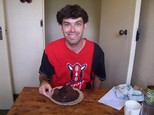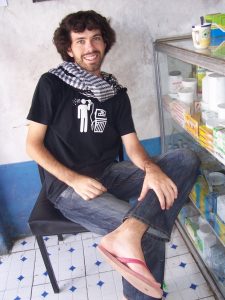 Pat came over today and we tried to bake brownies. I’ve tried it a few times before when Sara was here but we always missed some ingredients or had some other problems (oven doesn’t have degrees, only 1 -7!). The first batch was decent but I gave the second batch to the students because I wasn’t looking forward to eating OR cleaning that mess… I’m sure they loved all that chocolate and sugar, but that’s not a brownie, man! I’m getting a big discouraged because I’ve failed so many times. I even resorted to frying my cookie dough once because the pan was too big. I can get brownies in Nairobi at Java house, but it’s just not the same as a home-cooked Duncan Hines…
Pat came over today and we tried to bake brownies. I’ve tried it a few times before when Sara was here but we always missed some ingredients or had some other problems (oven doesn’t have degrees, only 1 -7!). The first batch was decent but I gave the second batch to the students because I wasn’t looking forward to eating OR cleaning that mess… I’m sure they loved all that chocolate and sugar, but that’s not a brownie, man! I’m getting a big discouraged because I’ve failed so many times. I even resorted to frying my cookie dough once because the pan was too big. I can get brownies in Nairobi at Java house, but it’s just not the same as a home-cooked Duncan Hines…
Food
Eight Months Left
I just realized the other day that I only have eight months left here in Kenya. Not that I’m counting down, but because I arrived in October, 2007 I should be leaving in October, 2009 I guess. I haven’t decided if I will leave early or extend a bit. Since I came back from the evacuation after last year’s post-election violence I have steadily become a full-time lecturer at the college. That’s important to note because we will have a semester beginning in August/September or so, and if I leave in October I will leaving more-or-less in the middle of the semester. Not cool! So we’ll just have to play it by ear… whatever that means, haha.

I took some friends to eat samaki (“fish”) yesterday and it felt like I was a tour guide or a local resident, walking around greeting people in Kiswahili and Kikamba, taking my friends through the back streets to my favorite spots. They’re four young German volunteers who stay somewhere around Tala. I had been seeing them for some time, always waving from a distance but never really running into them. Last week I crossed paths with one and we exchanged numbers, so this week we made plans to get together in the market and hang out. They’re all in their early twenties and pretty funny, so we have a lot in common and had a lot to talk about. We ate a few rounds of fish and then had chai/chapati before they had to get going. I don’t know if I’ll see them much, but it was at least nice to laugh and talk with some other young people doing something similar to what I’m doing.
On another related note, I am going on a small trip to Fourteen Falls with Pat, the Peace Corps volunteer from the next town over, tomorrow. I saw that Mark, the previous VSO volunteer here, had gone there with one of his buddies in 2005, so I’ve been meaning to go but plans kept falling through.
So stay tuned for some more pictures. I’m off to drink some tea and finish my notes for Monday’s Unix class. Maybe I’ll also watch some “TV” on my laptop.
Dates And Camel Stew
In search of fresh dates this weekend I went to Eastleigh, Nairobi’s prominently-Somali suburb. I had bought dates before in Nairobi supermarkets, but they’re both expensive and processed; I wanted the real deal, straight from the tree, man! The last month or two I’ve been going every other week or so to replenish my supplies. One kilogram costs 180 – 200 shillings (about $2.50) and it’s totally worth it. I also had some camel stew. When in Rome, right?
I have also discovered sweet potatoes. I never liked them when I was in the USA, I dunno why. I have learned that they’re pretty good here when you mix them with githeri (maize and beans). What I like is that I don’t have to add ANYTHING other than a few tea spoons of oil. No spices. No salt. I just boil the maize and beans in water for an hour or so, then peel, boil, and mash the sweet potatoes and then fry it all together with some oil. Natural goodness! Now all I have to do is start eating raw, uncooked vegetables.
Yes, I will cook authentic Kenyan food for you when I return to the USA.